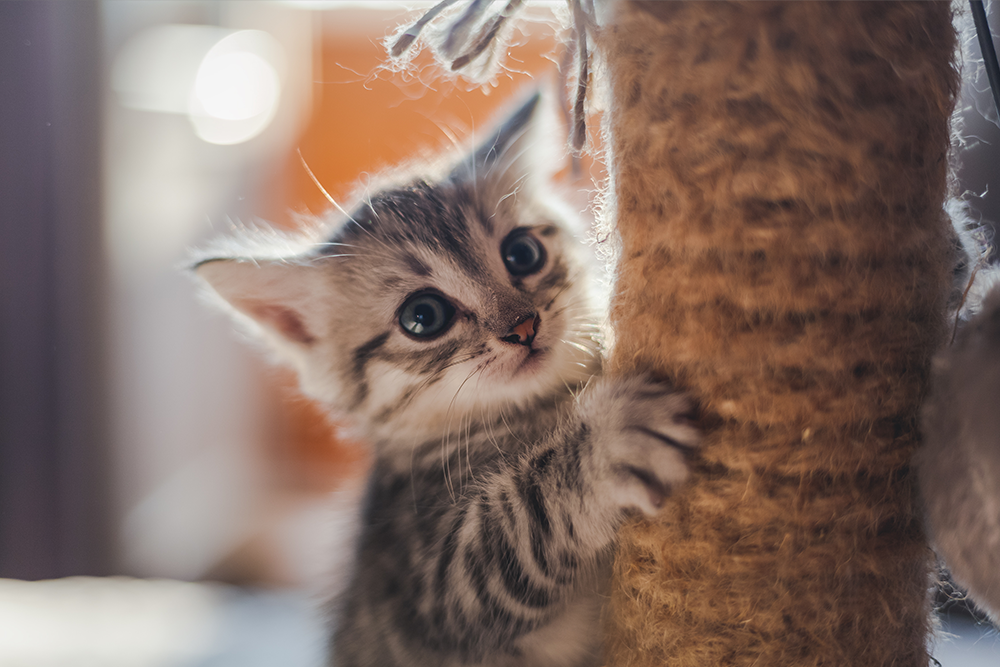
How Long Do Cats Live?
by Amy Smith - 9/16/19
Whether you’re a first-time cat parent with a brand-new kitten or an experienced one whose furry companion is getting to the elderly stage, you may be wondering how long your beloved pet will be in your life. How long a cat lives depends on many health and lifestyle variables. Learn what you can expect for each stage of your cat’s life and what choices can help extend his lifespan.
Indoor Versus Outdoor Cat Life Expectancy
Without question, you can expect that cats who spend their whole life indoors will live longer than those who spend a considerable amount of time outdoors. Some vets estimate that outdoor cats live around seven years, while indoor cats live an average of 14 years.
The big difference stems from the many dangers that beset an outdoor cat. While outdoor cats enjoy greater freedom, fresh air and sunshine, and more opportunities for hunting prey, they are in harm’s way from predators, such as coyotes and birds of prey. They are also exposed to more diseases from contact with other wildlife, and outdoor cats are unfortunately sometimes hit by automobiles when crossing roads or parking lots.
Maximizing Your Cat’s Longevity
For the reasons mentioned above, the single most impactful lifestyle choice you can make to extend your pet’s life is to keep him indoors for the most part. Beyond this, you can help your kitty live a long life by making sure he gets a healthy, balanced diet. Cats are naturally carnivores, so most of their nutrition should come from meat.
Keep an eye on his weight, too. An overweight cat is at higher risk for diseases such as diabetes, arthritis, liver disorders and high blood pressure. A healthy weight can be achieved by monitoring his diet and making sure he gets enough exercise. If your cat is living mostly indoors, encourage him to stay active by taking him for walks outside, providing an outdoor enclosure in which he can run free, setting up climbing toys or playing lots of active running and chasing games with him.
And don’t forget to keep your kitty up to date on his rabies vaccinations and regular wellness checks at the vet. These appointments can help you catch problems early while they are still treatable, potentially leading to a longer, healthier life.
Ages and Stages in Your Cat’s Life
Cats go through several distinct life stages. Surprisingly to many people, their most rapid growth occurs during the first six months of life. According to a chart from the American Animal Hospital Association, these crucial six months of kittenhood correspond to the human development period from newborn to 10 years-old. During this period of intense development, it’s recommended that you use a cat food specifically formulated for kittens, as these young animals need plenty of protein, DHA, vitamins and minerals to support their quickly growing bodies. You’ll also want to discuss a first round of vaccinations with your vet and consider having your kitty spayed or neutered.
From 6 months to 2 years, your cat is going through adolescence and early adulthood, equivalent to human growth up to about 24 years-old. Cats at this stage have outgrown the rambunctious behavior of kittenhood and usually need less supervision. At around 1 year-old, they can be transitioned onto adult cat food. Cats from 3 to 6 years-old are in their “prime,” approximately equivalent to a human progressing through their thirties and forties. From 7 to 10 years-old, they are “mature,” similar to a human approaching 50. Beyond 11 years-old they are “senior,” and a cat who hits 15 years is considered “geriatric.” Once cats reach the “mature” stage, around 7 years-old, they may tend to put on extra weight. You may need to consider cutting back on amounts of food or switching to a formula for elderly cats. Keep an eye on your older cat for pain, joint problems, weight fluctuations or difficulty eating, drinking and using the litter box.
With your loving care and attention at each stage of his life, along with a healthy diet and regular vet checkups, and barring unfortunate accidents or rare diseases, you can expect your cat to be a beloved presence in your home for 15 years or more.
Amy Smith is a writer specializing in family and parenting topics. She teaches English, Latin and music at a private school and lives with her husband, five children and three cats on a small homestead in rural Pennsylvania.
References
- https://scratchpay.com/blog/how-to-introduce-a-new-cat
- https://www.petmd.com/blogs/thedailyvet/jcoates/2011/aug/how_long_do_cats_live-11496
- https://www.seniorcatwellness.com/animals-that-prey-on-cats/
- https://healthypets.mercola.com/sites/healthypets/archive/2018/05/01/ways-to-help-cat-live-longer.aspx
- http://www.vetstreet.com/our-pet-experts/9-ways-being-overweight-can-hurt-your-cat
- https://www.aaha.org/graphics/original/professional/resources/guidelines/felinelifestageimg1.jpg
- https://www.hillspet.com/cat-care/healthcare/caring-for-your-cat-at-all-life-stages
- https://scratchpay.com/blog/how-to-spot-when-your-cat-is-in-pain




.jpg)

.jpg)
























.jpg)
























































.jpg)













